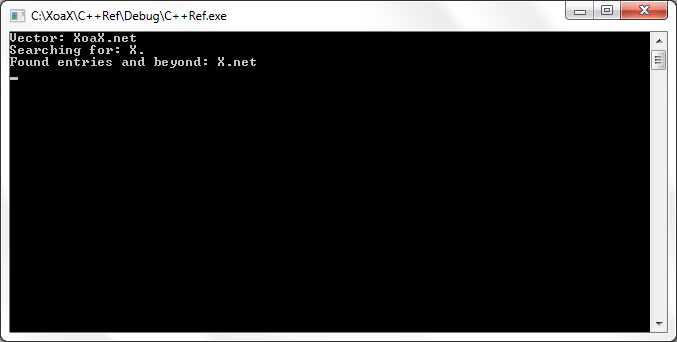algorithm - STL C++
find_end()
Declaration
template <class ForwardIterator1, class ForwardIterator2> void find_end( ForwardIterator1 xFirst1, ForwardIterator1 xLast1, ForwardIterator1 xFirst2, ForwardIterator1 xLast2 );
Description
This function finds the first set of entries in the range starting from "xFirst1" up to the entry before "xLast1" that are equal to the entries in the range from "xFirst2" up to the entry before "xLast2."Header Include
#include <algorithm>
Overloads
template <class ForwardIterator1, class ForwardIterator2, class Predicate> void find_end( ForwardIterator1 xFirst1, ForwardIterator1 xLast1, ForwardIterator1 xFirst2, ForwardIterator1 xLast2, Predicate xTest );
Example
#include <iostream>
#include <vector>
#include <algorithm>
int main()
{
using namespace std;
// Create a vector instance
vector<char> qV;
qV.push_back('X');
qV.push_back('o');
qV.push_back('a');
qV.push_back('X');
qV.push_back('.');
qV.push_back('n');
qV.push_back('e');
qV.push_back('t');
vector<char>::iterator qIter;
// Output the vector
cout << "Vector: ";
for (qIter = qV.begin(); qIter != qV.end(); ++qIter) {
cout << *qIter;
}
cout << endl;
// Search for the range
cout << "Searching for: ";
for (qIter = qV.begin() + 3; qIter != qV.begin() + 5; ++qIter) {
cout << *qIter;
}
cout << endl;
qIter = find_end(qV.begin(), qV.end(), qV.begin() + 3, qV.begin() + 5);
// Output the vector after the find
cout << "Found entries and beyond: ";
for (; qIter != qV.end(); ++qIter) {
cout << *qIter;
}
cout << endl;
// Keep the window open
cin.get();
return 0;
}Output

© 2007–2024 XoaX.net LLC. All rights reserved.
